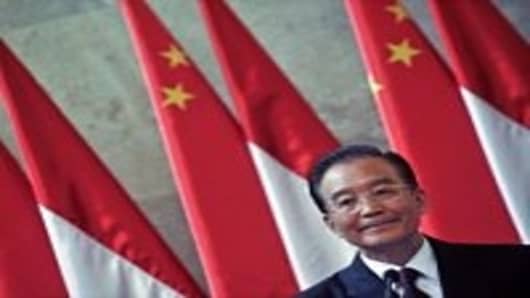BEIJING — Chinese and U.S. leaders said Friday that they had made important progress on a range of economic issues at their annual bilateral meeting, with Prime Minister Wen Jiabao of China saying the areas of agreement had included “some important breakthroughs.”
The comments came as a senior U.S. official, speaking on condition of anonymity, said that the Chinese had agreed to remove what U.S. officials say are unfair subsidies and favorable regulations affecting state-owned corporations and to allow foreigners to take bigger stakes in Chinese securities firms.
China’s state-owned behemoths, dominating strategic industries like steel and telecommunications, have become formidable competitors in some global markets and maintain a lock on many domestic ones.
U.S. officials attending the annual meeting, the Strategic and Economic Dialogue, were clearly eager to report some good news from China amid a furor over mishandled U.S. efforts to assist a leading Chinese dissident, Chen Guangcheng.
Treasury Secretary Timothy F. Geithner, meeting Friday with Li Keqiang, a Chinese vice premier, said the economic talks had achieved “very good progress.” Later, in prepared remarks for the meeting’s closing ceremony, Mr. Geithner praised the Chinese for moving toward a more flexible exchange rate system and loosening controls on moving of capital in and out of the country.
“These steps are significant and promising, and, we believe, will lead to further appreciation in the exchange rate over time against the dollar and other major currencies,” he said.
Wang Qishan, another Chinese vice premier, said the United States had agreed to back China’s effort to include its currency, the renminbi, in the International Monetary Fund’s basket of currencies. China wants to internationalize the renminbi to build it into a reserve currency like the dollar and the euro. But because the renminbi is not freely convertible, the I.M.F. has so far declined to include it in its basket of reserve currencies.
For the first time, according to senior U.S. officials, Chinese policy makers said they would commit to removing advantageous financing and regulatory conditions to state-owned enterprises, a significant step forward in the eyes of the administration of President Barack Obama, the official said, even though such changes might take years to implement.
China said it would review its policy of providing attractive — and some companies say unfair — financing for its exports. China is the biggest provider of export-credit financing, offering subsidized deals for companies buying goods from Chinese companies.
The United States, the European Union, Japan and other developed economies have a deal limiting the export credits a country can provide — an agreement that China is not party to and a point of contention for many manufacturers and service providers.
The senior administration official, speaking privately early Friday before the talks had formally concluded, also said that Chinese officials had indicated a willingness to require Chinese state-owned enterprises to pay out more of their earnings as dividends.
The official also said Chinese officials had agreed to allow foreign companies to take stakes of as much as 49 percent in joint securities ventures, up from the current limit of 33 percent, giving U.S. financial firms greater ability to invest in the country.
China also agreed to make it easier for U.S. companies to offer financing for car loans.
In return, U.S. officials agreed to start longer-term talks on allowing Chinese firms to invest in U.S. assets and industries and agreed to begin negotiating a bilateral investment treaty between the two countries.
U.S. officials in Beijing also raised the issue of China’s efforts to keep its currency at a low value in comparison with the dollar, making its goods relatively low-cost and American goods relatively expensive.
On Thursday, the head of the Chinese central bank said that the two countries had agreed that exchange rates should ultimately be market-determined. “The two sides have some views in common,” said Zhou Xiaochuan, the governor of the central bank, the People’s Bank of China. “They both think that exchange rates should be determined by a market system.”
The administration official also praised recent Chinese policy changes allowing more foreign investment and more open markets, which the official said had been an outgrowth of closer talks.
“China must rely more on domestic consumption rather than exports, and more on innovation by private companies, rather than capacity expansion by state-owned enterprises,” Mr. Geithner, the Treasury secretary, said as the dialogue started.
“Our countries have become thoroughly, inescapably interdependent,” Hillary Rodham Clinton, the secretary of state, said as the talks opened, heralding the two countries’ continuing economic cooperation. “The United States believes that a thriving China is good for America, and a thriving America is good for China.”
Correction: An earlier version of this article misspelled the surname of Chinese dissident Chen Guangcheng as Guangsheng.


